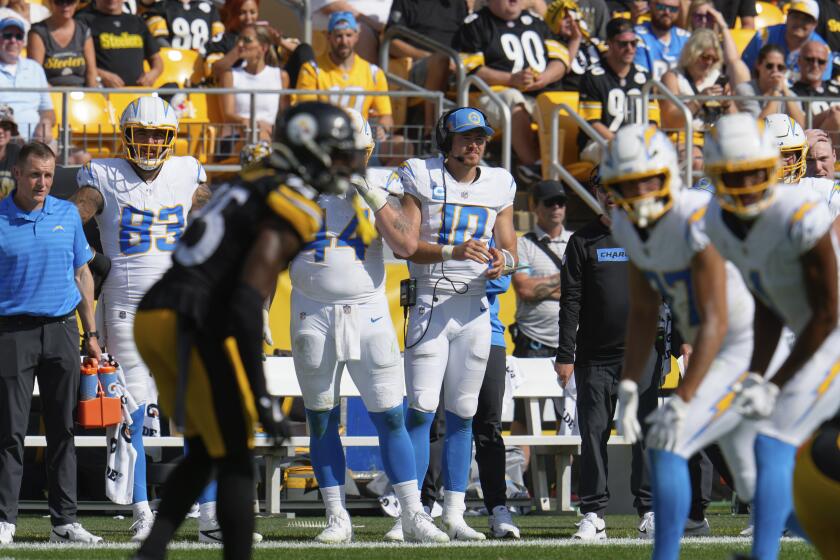Pennington Arrives
Chad Pennington, the New York Jets’ new leader, has spent the last three years making himself smoother, smarter, and faster.
In consequence, Pennington is now one of the smoothest and smartest quarterbacks in the NFL, if never the fastest.
He is also the best quarterback New York City has had since Joe Namath, whom he resembles, not in appearance maybe but as a football stylist.
Namath was last heard from 33 Super Bowls ago. So it’s about time that New York had another champion. And in last week’s Jet conquest of Green Bay, 42-17, Pennington looked like there’s a Super Bowl sometime in his future. A quarterback who can rout Brett Favre — in the game that Favre has to have to assure the steady home-field advantage that means everything in this year’s tournament — is clearly on his way.
New Namath Has Big Arm
PENNINGTON WASN’T THIS good a year ago, or even two months ago, and he knew it. He could throw a straight long pass — he could always throw the ball — but there is more to football than that, and he’s been learning. When Pennington joined the Jets in 2000 as a first-round but inexperienced prospect from Marshall, he brought with him a keen intelligence, a strong desire to study, and a deep interest in long hours of work — three things that not every talented pro is born with or acquires. And already, the Jets are cashing in, most spectacularly with the four Pennington touchdown passes that doomed Favre.
The new Namath has shown that he can throw a bomb. He can also put a proper touch on short or medium-range passes. Yet the most noticeable thing about him — during a streak in which the Jets have won seven of their last nine — is the Pennington smoothness: the effortless way he plays, the clear-mindedness. Standing back to pass, he shifts his attention swiftly and alertly from receiver to receiver, normally adjusting to just the right target at the right moment. At age 27, Pennington is also normal-sized for a modern NFL quarterback, 6 feet 3 and 225 pounds. He still lacks professional experience, to be sure, and that may hurt him awhile, but not forever.
Jets’ Three Quick Receivers
THE QUESTIONS NOW are whether Pennington is this year’s Tom Brady and whether the Jets are this year’s New England Patriots. On the final Sunday of the regular season, Pennington, though miles away from the Patriots, knocked them out of the playoffs on the afternoon they were beating Miami, 27-24.
Patriot quarterback Brady, the winner of last winter’s Super Bowl, only held on until the end of the season by throwing to running backs, mainly Kevin Faulk. The weakness of New England’s wide receivers, exposed in the early weeks of the season, kept Brady, one of the NFL’s great ones, from repeating as a champion.
His is a problem that Pennington doesn’t have. To build a 28-10 lead over Favre in the third quarter last Sunday, and drive him to the bench soon after, Pennington capitalized on the football know-how of his three quick, tricky, little receivers, Laveranues Coles, 5-11, 196; Wayne Chrebet, 5-10, 188, and Santana Moss, 5-10, 185.
Coles and Moss possess the speed that every passer wants. Chrebet is merely tricky. But as a group they’re so good that one of them was almost always open in the Green Bay secondary. Give Brady those three receivers — and put New England’s in New York — and Brady, not Pennington, is Super Bowl-bound, as promising as Pennington seems to be.
Edwards Foremost Jet Asset
THE JETS ARE a more substantial organization all-round than one might expect of a bunch that came out of nowhere to reach the playoffs in the final minutes of the NFL’s strangest season. This isn’t one of those lucky patchwork teams that sometimes sneak in at the last minute. The Jets could have led the East all season.
As of last September, they had everything a playoff team wants except the quarterback that Pennington has turned out to be. If they didn’t look that good on the field, even on defense, it was because, subconsciously, they doubtless wondered if their quarterback of the moment, Vinny Testaverde, was good enough.
The foremost Jet asset as the year began was the team’s top man, Herman Edwards, who in 2001 had finished 10-6 and made the playoffs in his first season as a head coach. Not bad for a rookie.
A onetime Los Angeles Rams’ defensive back, Edwards is a solid, positive human being — the opposite of the frantic coaches you often see along football sidelines and on basketball courts. And at 49, Edwards can look back on a diversified background as player, talent scout and coach.
Coming up, he played cornerback for three different colleges, including Cal, before putting in four years as an NFL player and a dozen as an assistant coach, mostly at Kansas City and Tampa Bay. If he is barely remembered by, say, the Rams, there are those who have been impressed by him all the way.
Pass-First Jet Prevails
EDWARDS LEARNED TWO things at Tampa Bay, where he rose to become first lieutenant to Tony Dungy, the defensive expert who in the late 1990s coached the Buccaneers to the NFL’s first level before taking over the Indianapolis Colts last year.
To begin with, Edwards mastered the extraordinary Dungy defense, the league’s finest. Second, he learned that defense isn’t enough.
So as his first move in New York — the first he thought about if not the first he actually made — Edwards brought in a competent offensive coordinator, Paul Hackett, whose knowledge of football offense is encyclopedic.
Even so, Edwards didn’t retire from offense, as other defensive coaches have done when promoted head coach. He knew he wanted a pass-first offense. Though Hackett, like Edwards, is an advocate of the Bill Walsh system, widely known as the West Coast Offense, the Hackett preference is for a run-first attack, particularly when the runner is the Jets’ jet, Curtis Martin.
The difference between Edwards and Hackett in offensive approach seems slight but is in fact astronomical. In pro football, it’s regularly the difference between winning and losing. Run-first teams believe in usually running on first down to set up their pass offense. Pass-first teams usually pass on first down to set up the rest of their offense. Because Edwards is in charge, the Jets are a pass-first team — and thus a champion in the super-competitive AFC East.
Jet Passer Can Play Three-Receiver Game
HACKETT HAS PROVIDED the intellectual assistance Edwards sought in an offensive leader, as you could see when Pennington was beating up on the Packer defense last week. A former head coach at USC and elsewhere, Hackett seems cut out to be an offensive coordinator.
And he seems content in that billet now that he doesn’t have to fret about trying for a better job, which must have been on his mind in former tours as an offensive coordinator. Nor does he have to worry about such distractions as team discipline, which bothered him at USC. That’s Edwards’ responsibility in this organization. Hackett can and does focus on but one thing now, offense.
The formations that all pro clubs employ are never quite the same when operated by a Hackett offensive team. He seldom uses the simple, straightforward plays that are good enough for the NFL’s many conservative coaches.
There is always a Hackett twist. Thus last week, the Jets, in rolling in 44 points, were always a step ahead of the Packer defense.
For one of many examples, when the Jets sent Martin bucking into the line, two offensive linemen pulled into the hole ahead of him, plus a blocking back. Most other coordinators simply call for an off-tackle blast, and, if it fails, blame someone, usually an offensive lineman.
A favorite Hackett formation places three wide receivers and a single running back in the same lineup. That is football’s finest formation, I’d say. Not long ago, Jim Kelly took Buffalo to four consecutive Super Bowls in three-receiver sets though in those years the Bills were rarely if ever the AFC’s most talented team.
In the Hackett system, three receivers are a natural because of the Jets’ three quick ones, Coles, Chrebet and Moss, and because running back Martin was built for one-back football — in which a third wide receiver replaces the fullback.
As every defensive coach and some offensive coaches understand, fullbacks are usually irrelevant. When a wide receiver substitutes for the fullback in a three-receiver lineup, the defensive team typically removes a linebacker — a man the fullback would likely have blocked, or tried to block, anyway, if they were both on the scene. The defensive replacement is invariably a smaller defensive back who improves Martin’s ground-gaining chance in the open field. Meanwhile, the pass offense has gained a third receiver. For the offense, therefore, it’s a win-win deal.
Three-receiver football is also a natural in the Jet offense because of Pennington, who appears to be one of the NFL’s few young quarterbacks with a mind so acute that he can, when heavily blitzed, hunt around for different targets, two or three of them at least. And before going down, he has arm enough to reach the open guy.
This is not to say that Pennington will instantly, or ever, take over the league. The NFL, contrary to some evaluations, is full of great quarterbacks from Brady and Favre to Michael Vick, Kurt Warner, Marc Bulger, Rich Gannon, Donovan McNabb, Jeff Garcia, Peyton Manning, Steve McNair, Drew Bledsoe, Drew Brees, and on and on.
But in New York, after Edwards and Hackett had everything else in place early last fall, Pennington gave them the precise weapon they need to keep rising on the Super Bowl totem pole, in the next two or three years if not sooner.
More to Read
Go beyond the scoreboard
Get the latest on L.A.'s teams in the daily Sports Report newsletter.
You may occasionally receive promotional content from the Los Angeles Times.










